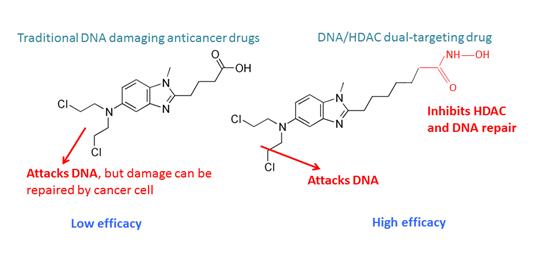
Majority of existing anticancer drugs attack single targets inside cancer cells. However, internal mechanisms for repairing drug-induced damage exist in cells and help cancer cells cope with the damage. This significantly limits the efficacy of existing drugs. Nitrogen mustards are a major type of genotoxic anticancer drugs. Several pathways exist in mammalian cells to repair such damage. As a result, these drugs exhibit poor potency and limited treatment success. Bendamustine is a nitrogen mustard with great clinical interest due to its beneficial outcome in treating several types of cancers. However, the efficacy of bendamustine is limited by its poor drug potency. Therefore, bendamustine represents an interesting candidate for drug optimization.
LIU Chuan, DING Hongyu, LI xiaoxi and fellow lab mates from a research group led by Prof. JIANG Hai at the Institute of Biochemistry and Cell Biology, Shanghai Institutes for Biological Sciences of Chinese Academy of Sciences collaborated with Crystal LLC, USA to screen a series of chemical derivatives of bendamustine. Among these, CY190602 displayed an unexpected 50 to 100 fold enhanced anticancer toxicity.
By using unique functional genetic screening system, CY190602 was found to harbor not only traditional DNA damaging group, but also a novel HDAC inhibitory activity in its side chain. Interestingly, after analyzing DNA repair genes in ATR-Chk1, FA, TLS and HR pathways, researchers found that several important genes participated in DNA damage repair including Tip60, CBP, MORF, and MSL1 were all greatly suppressed after HDAC inhibition, which reduced cellular DNA repair capacity. Therefore, CY190602 could not only attacks DNA, but also inhibit DNA repair in cancer cells, which explains its significantly enhanced anticancer efficacy.
In a series of mouse cancer models, CY190602 performed much more effectively than many traditional anticancer drugs, while exhibiting less toxicity to normal cells such as hematopoietic stem cells. In a transplanted BCR-ABL driven acute lymphoblastic leukemia mouse model, CY190602 even rivaled the therapeutic effects of a BCR-ABL specific inhibitor, which confirmed CY190602 potent anticancer capacity in vivo.
Comparing to traditional nitrogen mustards, CY190602 with newly gained HDAC inhibitory capacity can kill cancer cells with much higher efficacy. The study of CY190602 as a prototype of DNA/HDAC dual-targeting drug demonstrated that by incorporating small enzyme inhibitory moiety into traditional DNA damaging drugs, it is possible to achieve higher potency against cancer cells. Importantly, the result showed that it is structurally compatible to incorporate small enzyme inhibitory chemical moieties into traditional DNA damage drugs, and such modifications can significantly enhance these drugs’ anticancer activity. Following the same rule, a number of novel drugs such as DNA/CDK1 dual-targeting drugs have been synthesized and exhibited high efficacy in preliminary studies. Such kind of novel dual-targeting drugs may by itself improve cancer treatment, and their much-enhanced anticancer potency also offers new possibilities for antibody-coupled, tumor-targeting drug delivery research. This may provide several novel categories of anticancer drugs for clinical investigation.
This study entitled “A DNA/HDAC dual-targeting drug with significantly enhanced anticancer potency” was published on EMBO molecular medicine on March 10, 2015.
This work was done in collaboration with Crystal Biopharmaceutical LLC, USA, with participation of researchers from Second Military Medical University, MIT, Hangzhou Minsheng Pharma Research Institute Ltd, University of New Mexico and NIH. It was supported by grants from the National Natural Science Foundation of China, major scientific research project of Sciences & Technology Commission, Shanghai Municipal Government.

Figture. This picture illustrated that compared to traditional DNA damaging drugs, the novel DNA/HDAC dual target drug can attack DNA and inhibit HDAC and DNA repair at the same time, therefore, reinforcing the toxicity to cancer cells. (Image by Prof. JIANG Hai`s group)
CONTACT:
JIANG Hai, Principal Investigator
Institute of Biochemistry and Cell Biology, Shanghai Institutes for Biological Sciences, Chinese Academy of Sciences
Shanghai 200031, China.
Email: hai@sibcb.ac.cn
Phone: +86-21-54921190

86-10-68597521 (day)
86-10-68597289 (night)

52 Sanlihe Rd., Xicheng District,
Beijing, China (100864)

